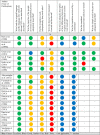The integration of idioms of distress into mental health assessments and interventions: a systematic review
- PMID: 31143467
- PMCID: PMC6521171
- DOI: 10.1017/gmh.2019.5
The integration of idioms of distress into mental health assessments and interventions: a systematic review
Abstract
Background: Psychiatric diagnostic manuals recognise the importance of local expressions of distress in culturally diverse settings [i.e. idioms/cultural concepts of distress (CCDs)], yet there is a lack of consensus on how these should be incorporated into mental health related research.
Aims: To perform a narrative synthesis and critical review of research exploring how idioms/CCDs have been integrated into assessment measures and interventions.
Method: A systematic review was conducted in accordance with PRISMA guidelines. An adapted version of the COSMIN checklist was used to assess the quality of the linguistic translation of the idioms/CCDs.
Results: Twenty-nine papers were included in the final review. Primary qualitative research was the most common method of gathering information about idioms/CCDs. The majority of studies described integrating idioms/CCDs into assessment measures as opposed to interventions. Some studies used information relating to idioms/CCDs to develop novel assessment measures, while others adapted pre-existing assessment measures. The measures generated moderate to high levels of validity. Information relating to the linguistic translation conducted in the completion of the studies tended to be inadequately reported.
Conclusions: Integrating information about idioms/CCDs into assessment measures can enhance the validity of these assessments. Allocating greater research attention to idioms/CCDs can also promote more equitable exchanges of knowledge about mental health and wellbeing between the Global North and the Global South.
Keywords: Assessment; cultural concepts of distress; idioms of distress; intervention; translation.
Figures
References
-
- Abeyasinghe DRR, Tennakoon S, Rajapakse N (2012). The development and validation of the Peradeniya Depression Scale (PDS) – a culturally relevant tool for screening of depression in Sri Lanka. Journal of Affective Disorders 142, 143–149. - PubMed
-
- American Psychiatric Association (2013). Diagnostic and Statistical Manual of Mental Disorders: DSM-5. American Psychiatric Association: Washington, DC.
-
- Andrews J, Fay R, White RG (2018). From linguistic preparation to developing a translingual orientation – possible implications of plurilingualism for researcher education In Plurilingualism in Learning and Teaching: Complexities Across Contexts, pp. 220–233. (ed. Choi J., Ollerhead S., French M.), Routledge: London.
-
- Applied Mental Health Research Group (2013). Design, implementation, monitoring, and evaluation of mental health and psychosocial assistance programs for trauma survivors in low resource countries: A user's manual for researchers and program implementers. Module 1: Qualitative assessment. [Online]. United States: John Hopkins University. Bloomberg School of Public Health. Available at: http://www.hopkinshumanitarianhealth.org/assets/documents/VOT_DIME_MODUL....
-
- Bass JK, Ryder RW, Lammers M, Mukaba TN, Bolton PA (2008). Post-partum depression in Kinshasa, Democratic Republic of Congo: validation of a concept using a mixed-methods cross-cultural approach. Tropical Medicine & International Health 13, 1534–1542. - PubMed


